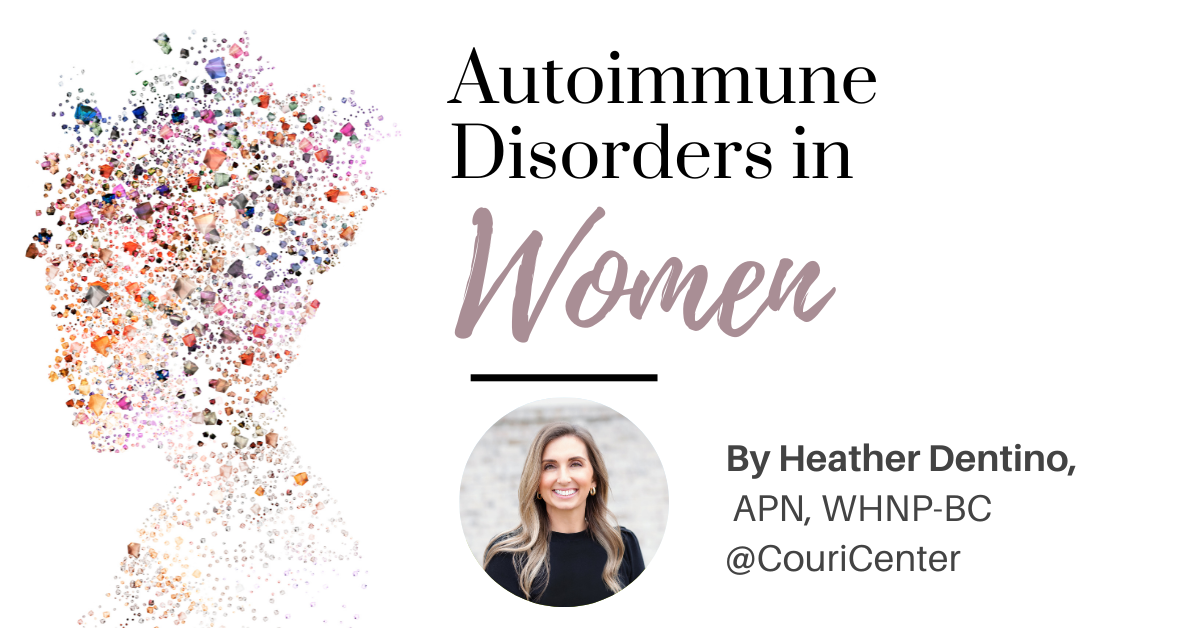
Summary
In her insightful blog article, Heather Dentino, APN, WHNP-BC, sheds light on the prevalence of autoimmune disorders in women, highlighting that over 75% of individuals diagnosed with these conditions are female. Heather explains how the interplay of hormonal transitions, genetics, and environmental factors can trigger autoimmune disorders in women. Drawing from her personal experience, she shares her journey of discovering celiac disease and the transformative impact of a gluten-free diet on her health. Her article is a valuable resource for women seeking to better understand autoimmune disorders and their potential link to dietary sensitivities or underlying health conditions.
Unveiling Autoimmune Disorders in Women By Heather Dentino, APN, WHNP-BC @CouriCenter
An autoimmune disorder is a condition in which the body’s immune system mistakenly identifies healthy tissue or organs as a threat. This results in an attack on the tissue or organ system which causes damage, dysfunction, and often systemic inflammation. Greater than 75% of individuals diagnosed with autoimmune disorders are female, and an astonishing 85% or more of those with multiple autoimmune disorders are female.
Throughout their lifetime, women undergo a series of extensive endocrinological or hormonal transitions, including puberty and menopause, and for many, the addition of pregnancy and breastfeeding. These periods of sustained hormonal disruption, combined with genetic susceptibility and environmental injury, can trigger the development of an autoimmune disorder.
Common Autoimmune Disorders in Women:
- Systemic lupus erythematosus (Lupus)
- Multiple sclerosis
- Thyroid diseases
- Rheumatoid arthritis
- Psoriasis
- Type 1 diabetes
My Personal Journey
In the year following the birth of my 3rd child, I noticed that I didn’t quite feel like myself. I was more tired than normal, felt bloated frequently, and was puffy all over. I chalked it up to the fact that I was a bit older when I’d had my son, and therefore the pregnancy had taken more of a toll on me than my previous pregnancies. I didn’t look into it much and accepted it as my new normal. After I graduated from nurse practitioner school and began working at the Couri Center, I spent some time with our registered dietitian, Leslie Rusch-Bayer, who encouraged me to have food sensitivity testing to evaluate the symptoms I was having. The results of that test were life-changing for me. The results showed that I’d had an inflammatory reaction to every gluten-containing grain on the panel. Leslie and Lauren Ponder, APN, suggested that I be tested for celiac disease.
Celiac disease is an autoimmune disorder in which the body recognizes gluten as a foreign invader. When gluten is consumed, the immune system sends T-cells to attack the gluten, which causes severe damage to the small intestine. If left untreated, celiac disease can lead to a myriad of health complications like early onset osteoporosis, infertility and miscarriage, malnutrition, heart disease, and cancer.
I underwent additional laboratory testing for celiac disease that was positive and went on to have an upper endoscopy which further confirmed the diagnosis. The only treatment for celiac disease is a lifetime commitment to a gluten-free diet. Since being gluten-free for the past 5 months, I have experienced increased energy, improved mood and mental clarity, and optimal digestion.
Listen to Your Body
The symptoms for not only celiac disease but many autoimmune disorders can be vague and differ among those diagnosed with the disease. If you have been living with chronic fatigue, hair loss, bloating, frequent headaches, joint pain, or inflammation, I encourage you to schedule an appointment with your provider to discuss these symptoms. Our trained providers at the Couri Center can help you determine if your symptoms are related to dietary sensitivity or possible underlying disease.
Heather Dentino, Advanced Practice Registered Nurse
DISCLAIMER: The information provided on this website is intended for general informational purposes only and is not intended to be a substitute for professional medical advice, diagnosis, or treatment. The information provided is current as of the date of publication or last review, but medical knowledge is constantly evolving, and the information may become outdated over time.
Sources
Angum, F., Khan, T., Kaler, J., Siddiqui, L., & Hussain, A. (2020). The Prevalence of Autoimmune Disorders in Women: A Narrative Review. Cureus, 12(5), e8094. https://doi.org/10.7759/cureus.8094
Desai, M. K., & Brinton, R. D. (2019). Autoimmune Disease in Women: Endocrine Transition and Risk Across the Lifespan. Frontiers in endocrinology, 10, 265. https://doi.org/10.3389/fendo.2019.00265
What is celiac disease? Celiac Disease Foundation. (2021). https://celiac.org/about-celiac-disease/what-is-celiac-disease/
